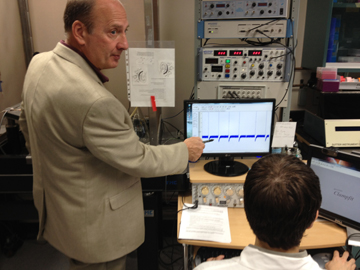
Dr. Ben Albensi

Dr. Benedict C. Albensi
Principal Investigator, Synaptic Plasticity and Cellular Memory Dysfunction
Division of Neurodegenerative Disorders, St-Boniface Hospital Research
Associate Professor of Pharmacology and Therapeutics, University of Manitoba
Dr. Albensi’s lab focuses on the biological basis of how normal memory works and finding ways to learn how memory is affected when it is impaired. Dr. Albensi describes one process associated with memory formation as synaptic plasticity.
Synaptic plasticity is a term to describe how cells change anatomically in response to new memory formation.
Much of the work in his lab is centered on memory impairments in Alzheimer’s dementia and epilepsy.
“There is a connection between epilepsy and Alzheimer’s,” he says. “People with Alzheimer’s often have a higher risk for having seizures.”Dr. Albensi’s team is looking at a number of ways to help find out what causes dementia. He believes that the problem can’t be fixed until you know how it works, and that is why he also studies normal memory.
Dr. Albensi says individual cells talk to each other in specific ways. These cells change as a result of learning. “The problem is that it doesn’t do you any good if you can’t remember what you just learned.”
His team uses a wide range of tests including MRIs in animals. The MRI results are studied and compared to results in humans. The tests are used to get a better understanding of how certain factors play a part in the degeneration of brain cells.
They also are able to measure electrical activity in brain tissue removed from animals. “We can keep slices of brain tissue alive and viable for hours,” he explains. They measure electrical activity in the cells of the tissue and monitor this activity to characterize how the cells are functioning.
Dr. Albensi explains that the parts of the brain that are involved in memory have been mapped to some degree. “We know how the cells talk to each other.”
For example, the team is able to replicate what happens during learning and memory, by using electrical stimulation to simulate the type of activity one experiences during the learning process.
Another study being done in the lab is based on molecular biology. The team looks for transcription factors that are important for turning genes on or off. Once some of these factors are activated by stimulation, they move into the nucleus of the cells and once inside they turn on genes that haven’t been expressed. Some of these genes play a direct role in memory and also in disease.
Dr. Albensi also talks about the possibility of using creatine to reverse disease. He says creatine has been proven to be safe and is often used to help build muscle mass. It has been clinically tested in Huntington’s disease and Parkinson’s disease, but has not yet been tested for the most part when it comes to dementia and Alzheimer’s disease.



